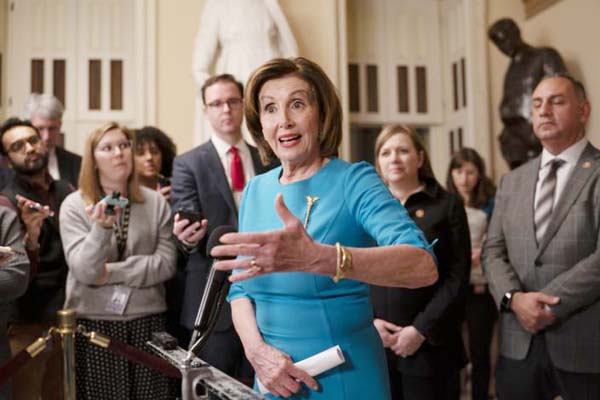
AP, Washington :
The House passed sweeping legislation Saturday to respond to the coronavirus outbreak battering the nation, an overwhelmingly bipartisan vote to expand access to free testing, provide $1 billion in food aid and extend sick leave benefits to vulnerable Americans.
The bill’s bipartisan passage, 363-40, was virtually assured when President Donald Trump backed the measure – largely hammered out by Speaker Nancy Pelosi and Treasury Secretary Steven Mnuchin – and urged Republicans to support the bill.
Trump’s tweet, just before 9 p.m., capped several days of whiplash as Democrats and the White House appeared, at times, inches from a deal only to see it yanked away amid technical disputes and inconsistent signals from the president. Trump’s backing, though, was essential to ensure support from congressional Republicans for the multi-billion dollar plan.
Democrats put the bill on the floor shortly after midnight under an expedited process and passed it in the early hours of Saturday morning, sending it to the Senate, which is expected to take it up as early as Monday.
The bill is the product of a painstaking effort by Pelosi to pass a measure with bipartisan support rather than a doomed Democrat-only bill that the Senate would have immediately spiked. “[W]e thought it would be important to show the American people, assure the American people, that we are willing and able to work together to get a job done for them,” Pelosi said. “So we thank our Republicans – those who will be supporting the bill. We appreciate the president joining us with his tweet.”
Pelosi said the final bill came together slowly because of a laborious review process in the executive branch, which required approvals from multiple agencies and officials. Pelosi praised Mnuchin for his cooperation, and she acknowledged she never directly spoke with Trump about the bill. “There was no need for that,” she said.
Alongside Pelosi, Majority Leader Steny Hoyer said he expected House committees to be working through next week’s recess on a new bill meant to address the economic damage wrought by coronavirus, which has devastated the airline, hospitality and entertainment industries. For now, though, Democrats said they were pleased to pass a bipartisan plan that they expect to pass overwhelmingly in the House and move through the Senate by Monday.
“I think this was a very good sign of bipartisanship and working together, that we can overcome this virus. We’ve done much bigger things before,” House Minority Leader Kevin McCarthy (R-Calif.) told reporters Friday night, minutes after the deal was announced.
On Saturday morning, Trump tweeted: “Good teamwork between Republicans & Democrats as the House passes the big CoronaVirus Relief Bill. People really pulled together. Nice to see!”
Trump’s approval came after a hard-fought – and chaotic – day of negotiations, with Democrats and Republicans alike unsure whether the president was on board with the proposal.
For several hours before Trump’s tweet, talks had devolved into a state of confusion, with key officials on both sides directly contradicting each other on whether a deal exists.
“Because it was essential for us to have legislation pass the House by this weekend, it required intense and constant negotiations for what could have been an elusive agreement,” Pelosi said in a letter to fellow Democrats after 10 p.m. on Friday, thanking them for their patience amid the frenetic back-and-forth with the administration.
Pelosi had announced to her members shortly after 6 p.m. that she had reached a deal. But House Republicans – and even Hoyer, the No. 2 House Democrat – had said talks were still ongoing and a deal had not yet been reached.
Key Republicans cautioned that there were still lingering issues related to a tax credit for paid family sick leave. McCarthy later confirmed that Republicans sought more flexibility for small business owners who would be forced to offer paid leave to affected workers.
Adding to the confusion, Mnuchin surprised even members of his own party by announcing on Fox Business that he had reached an agreement with Pelosi. The Treasury secretary had huddled with Trump just minutes before – a meeting that delayed his appearance on the network for so long that Mnuchin ran out of time to speak before the program ended.
Trump eventually tweeted his support hours later, delivering long-awaited relief to hundreds of members and aides who had spent 48 hours in limbo awaiting any updates about the status of the funding package.
“I fully support H.R. 6201: Families First CoronaVirus Response Act, which will be voted on in the House this evening,” Trump tweeted. “I have directed the Secretary of the Treasury and the Secretary of Labor to issue regulations that will provide flexibility so that in no way will Small Businesses be hurt. I encourage all Republicans and Democrats to come together and VOTE YES!”
One of the other major obstacles involved the president’s personal demand for a payroll tax cut in this package. That idea has little support on Capitol Hill, and Democrats have already said it would be debated as part of future coronavirus crisis-related legislation at a later date.
McCarthy, who met with Trump and Mnuchin multiple times in the last 24 hours, confirmed that Trump had sought the last-minute addition, and said Republicans would push for it in Congress’s next tranche of economic relief, which could come later this month or in April.
“I believe this will not be the only one,” McCarthy said, alluding to future aid packages related to the outbreak. “This is something that the president wants, we would have liked to have that as well. I think that would have taken a little more time.”

